Fake Ozempic jabs have left Brits desperate to lose weight in a COMA: Urgent ‘do not use or buy’ alert over fat-fighting injections sold online
Fake versions of Ozempic have left Britons desperate to lose weight in comas, health chiefs warned today.
The once-a-week jab, made by Danish pharmaceutical giant Novo Nordisk, is being offered by the NHS to help patients with type 2 diabetes control their blood sugar levels.
Semaglutide – the generic name for Ozempic – also causes weight loss and deserves praise as a ‘miracle’ weight loss injection.
Due to the enormous global demand, counterfeit versions have flooded the market.
Officials have seized 369 possibly counterfeit Ozempic pens since the beginning of the year.
Counterfeit versions of Saxenda, another similar weight loss drug, obtained through ‘illegitimate routes’ have also been reported to the Medicines and Healthcare products Regulatory Agency (MHRA).
Watchdogs said Brits have been hospitalized after possibly taking fake jabs.
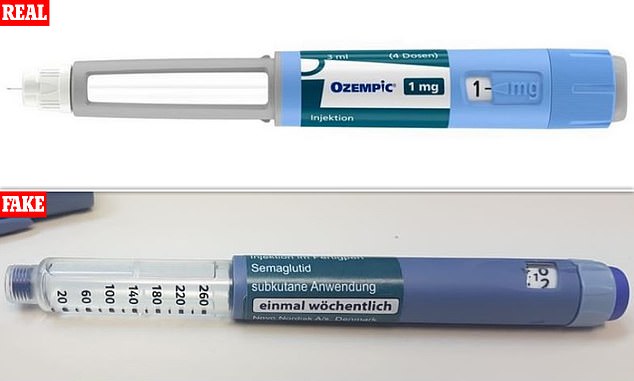
Officials have seized 369 potentially counterfeit Ozempic pens since the start of the year, the Medicines and Healthcare products Regulatory Agency (MHRA) revealed. Reports have also been received of counterfeit Saxenda pens obtained by Britons through ‘illegitimate routes’, it warned
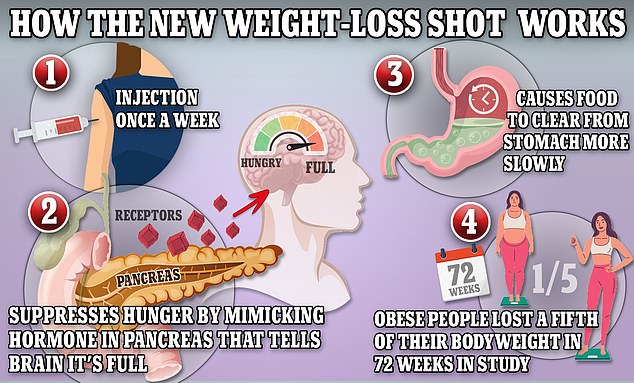
Wegovy and Ozempic work by causing the body to produce a hormone called GLP-1, which is released naturally from the intestines after meals.
It did not say how many people were sick, only revealing that it was a “very small number.”
Buying prescription medicines online without a prescription poses an ‘immediate danger to health’, the MHRA said.
“For medicines purchased outside the legal supply chain, the contents may not match the ingredients on the label,” a safety alert said.
‘Serious side effects reported in people admitted to hospital, including hypoglycaemic shock and coma, indicate that the pens may contain insulin instead of semaglutide.’
If too much insulin is injected into the body, blood sugar levels can drop to dangerously low levels.
Dr. Alison Cave, chief safety officer of the MHRA, said: ‘Buying products such as Ozempic or Saxenda without a prescription from illegal suppliers significantly increases the risk of receiving something that is fake or not licensed for use in Britain.
‘Products purchased in this way do not meet our strict quality and safety standards, and the use of such medications can significantly endanger your health.
‘We advise all members of the public not to use pre-filled slimming pens purchased online and instead report this to us so that we can investigate and take appropriate action.’
Health Minister Will Quince added: ‘No one should put profits before the needs of patients, but fraudsters selling these types of medicines on the black market are extremely dangerous and can put people’s health at risk.
‘The medical advice is clear: patients should only take medicines such as Ozempic or Saxenda if they have been prescribed by a legitimate source, such as their GP or other legitimate prescriber.
‘The MHRA has our full support in cracking down on these illegal online suppliers to ensure patients are protected.’
All pharmacies in Britain, including those online, must be registered with the General Pharmaceutical Council (GPhC) and meet their standards.
Anyone concerned about their health should visit a GP or pharmacist for a correct diagnosis, the MHRA urged.
Bosses at the European Medicines Agency announced last week that counterfeit versions of Ozempic had hit the market.
The fake jabs had batch numbers, barcodes and unique serial numbers copied from genuine Ozempic packages.
But when scanned as part of an EU-wide electronic system, the serial numbers were found to be inactive, alerting authorities that they may be fake.
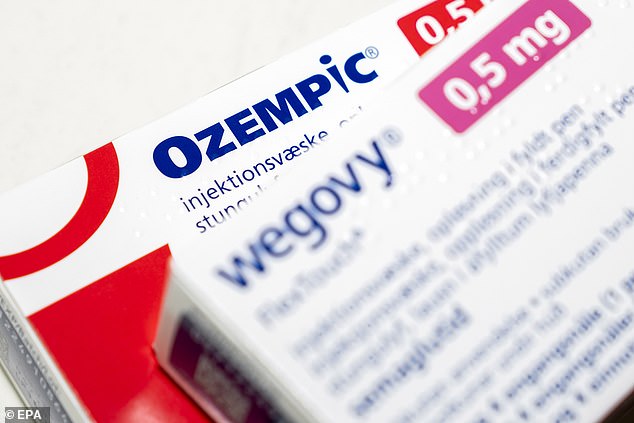
Ozempic is available on the NHS as a treatment for controlling blood sugar levels in people with type 2 diabetes. In May it was also approved for weight loss under the Wegovy brand, but has yet to be launched in Britain due to supply issues
A separate alert from Germany’s Federal Institute for Drugs and Medical Devices also stated that the fake versions came in packs of three and had an expiration date of July and December 2025.
It shared the serial and batch codes for the affected products, but warned that these had been copied from genuine Ozempic boxes.
As a result, it warned that it was almost impossible to distinguish the real and fake versions from the boxes they came in.
However, the fake injectable pens have a clear rather than gray lid, and the bottom of the pen is a slightly darker blue than the original. The label markings and dose are also slightly different.
Semaglutide has ushered in a new era in the war against obesity. The treatment, loved by Hollywood stars, encourages weight loss by mimicking the action of a hormone released in the gut after eating, called GLP-1.
The GLP-1 hormone not only tells the pancreas to produce more insulin, but it also returns to the brain and makes users feel full.
As a result, semaglutide can keep users from overeating.
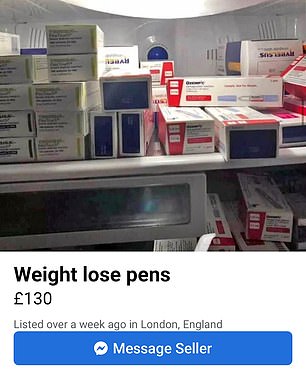
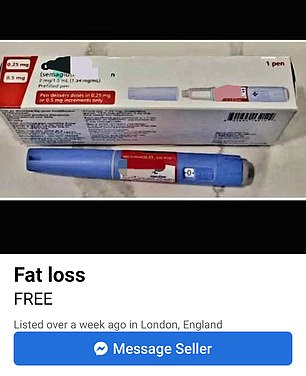
In September, MailOnline found sellers on Facebook Marketplace offering slimming shots for sale without the need for a prescription. One seller shows an image of a fridge full of medicines and lists the slimming jabs for £130, pictured on the left. Another seller mentions semaglutide, a drug found in both Ozempic and Wegovy, pictured at right
In July, the UK Department of Health urged doctors and pharmacists to stop prescribing Ozempic to people who simply want to lose weight.
Health officials warned that the clamor to get their hands on it – and drugs like it – was fueling the national shortage, putting the lives of diabetics at risk.
Ozempic is available on the NHS as a treatment for controlling blood sugar levels in people with type 2 diabetes.
In May, another version of semaglutide was approved for weight loss under the brand name Wegovy. It is not yet widely available in the UK due to supply issues.
The slowdown has led to an increase in “off-label” prescribing – where drugs are dispensed for something other than their intended use – exacerbating shortages.
Although patients are eager to take the medications, it is not without side effects.
Users often complain of nausea, constipation and diarrhea after taking the medication. Less common side effects include altered taste and acute pancreatitis.
MailOnline revealed earlier this year that Novo Nordisk is investigating whether semaglutide could increase the risk of medullary thyroid cancer and pancreatic cancer.
But there is no evidence yet that they are definitely side effects, even in extremely rare cases.
All Britons are urged to report any side effects from medicines they notice to the MHRA’s Yellow Card Scheme.
The EMA is already investigating Ozempic and similar weight loss blockbusters over concerns they could cause users to think about self-harm.
Health chiefs were shocked by reports from Iceland of three patients who had thoughts of self-harm and suicide after taking the injections.
Suicidal thoughts are mentioned as a possible consequence in leaflets already included in the pack.
